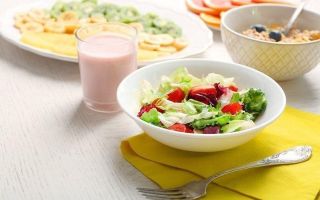Content
The diet for reflux esophagitis during an exacerbation should be aimed at reducing the frequency of reflux and preventing complications of this pathology. During the diet, it is necessary to exclude some food, cold or, conversely, too hot food. In addition, during the treatment of reflux esophagitis, it is not recommended to lie down immediately after eating, to do any physical work associated with bending forward, lifting weights.
Features of nutrition with reflux esophagitis
Esophagitis is a pathology of the esophageal mucosa, its inflammation. The most common cause of the disease is gastroesophageal reflux, which results in mucosal injury due to acid exposure. When esophagitis is caused by reflux, it is called reflux esophagitis. Other causes of the disease include various infections (usually viral), chemical poisoning, physical damage to the esophagus.
Reflux esophagitis can occur in an acute form, which is manifested by pain when passing the food lump, burning sensation, pain in the neck, belching. In the chronic form of the disease, patients complain of pain in the supine position, while running and jumping, they note belching, heartburn, nausea and vomiting.
The diet for reflux esophagitis, as well as gastritis, has some features, they must be followed by patients with this pathology. Basic nutritional principles:
- do not eat prohibited foods, so as not to aggravate the inflammatory process;
- eat at least 5-6 times a day;
- strictly observe the correct drinking regime - do not consume more than 1 liter of liquid per day;
- chew food thoroughly before swallowing;
- the serving size should be reduced to 200-300 g, while maintaining the balance of BJU and calorie content;
- it is forbidden to eat food at night;
- all products during the treatment of reflux esophagitis should be stewed, boiled, baked;
- tough food needs to be grated or chopped;
- meals should be served warm;
- smoking and drinking alcoholic beverages are prohibited.
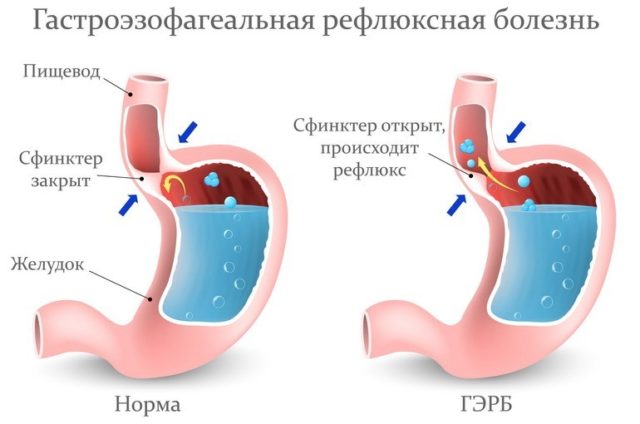
In addition, with reflux esophagitis during an exacerbation, experts recommend eliminating heavy lifting, sharp forward bends, immediately after eating, you cannot take a horizontal position. During sleep, it is necessary to raise the head on the pillow to avoid food being thrown into the esophagus.
Diet for chronic esophagitis
Nutritional therapy for the chronic course of esophagitis and gastritis should be complete, with a sufficient content of proteins, fats, carbohydrates. The main task of the diet for this disease is to protect the inflamed mucous membrane of the esophagus and stomach from adverse effects. Therefore, for a therapeutic diet for gastritis and esophagitis, select those food products that do not injure the gastrointestinal tract and do not stimulate the formation of hydrochloric acid.
The duration of the diet for reflux esophagitis is determined by the attending physician, depending on the patient's condition. Usually it is 3 to 5 months.During the period of the diet, all existing ulcers and erosion on the mucous membrane of the esophagus and stomach should heal.
The diet for the chronic form of reflux esophagitis is not as strict as for the exacerbation of the disease. A gastroenterologist will help you adjust your diet if necessary. Perhaps he will allow the use of some products from the prohibited list. However, the patient should be prepared for the fact that a number of products will forever remain banned. Such food includes fatty, fried, too spicy dishes, various sauces and smoked meats, mushrooms, marinades.
While on a diet, in the chronic course of gastritis of the esophagus, it is permissible to eat the following foods:
- not too rich broths;
- lean meats, fish and chicken (boiled or steamed);
- pates;
- lean ham and sausages;
- unsalted cheeses;
- boiled, baked or steamed vegetables;
- low-fat, non-acidic dairy products;
- porridge in water or milk of a semi-viscous consistency;
- sweet ripe fruits;
- weak tea, coffee with milk;
- dried bread, pies and buns made from non-yeast dough.
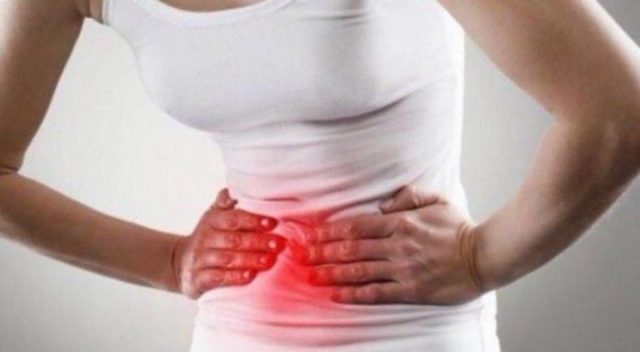
For chronic reflux esophagitis, lightly fried foods can be eaten without crusting. In this case, it is worth monitoring the state of the body, if such food causes unpleasant sensations, then it is better to refuse it.
Diet with exacerbation of esophagitis
The diet during exacerbation of reflux esophagitis is usually quite strict, unbalanced, since it is aimed primarily at unloading the gastrointestinal mucosa. The duration of this feeding period is about 10 days. Diet No. 1A for reflux esophagitis does not allow rich broths, fatty meats and fish, spices and sauces, carbonated drinks, vegetables and fruits, bakery products in the diet.
During the period of exacerbation of reflux esophagitis, mashed or liquid soups, cereals are indicated for use, once a day you can eat meat in the form of mashed potatoes or soufflé. Allowed dietary meats and fish, low-fat milk, low-fat cottage cheese, steamed omelets, boiled eggs, weak tea, milk porridge. If, after such a diet, the patient does not experience heartburn, belching, pain, then he is transferred to diet number 1B. It is not so strict and allows you to use soups with chopped vegetables, meat and fish cutlets, vegetables and fruits from baby food. The diet allows adding milk up to 3 times, cottage cheese, vegetable purees to the diet.
Diet menu for esophagitis of the esophagus and gastritis
The basis of dietary therapeutic nutrition for reflux esophagitis are important principles:
- food should not aggressively affect the inflamed membrane of the esophagus and stomach;
- food products should not increase gas formation, intestinal bloating;
- the food consumed should not lower the acid-base balance of the stomach contents.
The diet for reflux esophagitis must perform a therapeutic function, for this the patient needs to reconsider the diet, his taste habits and consume only those foodstuffs that contribute to a speedy recovery.
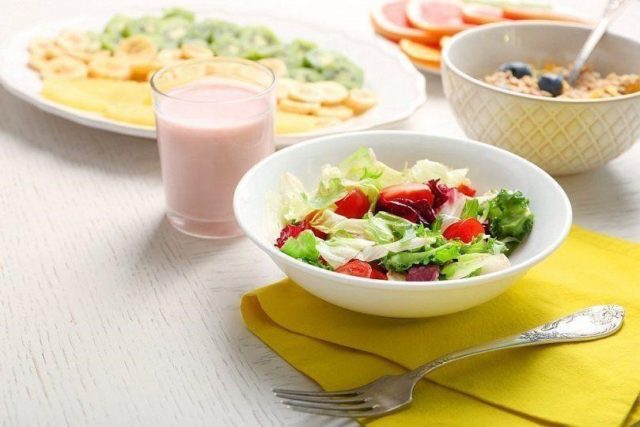
During nutrition, adherence to a diet for reflux esophagitis, you must adhere to the following rules:
- you need to eat often, but in small portions - this will prevent stomach overflow and reduce the production of gastric juice;
- food should be warm;
- before meals, you can drink a glass of still mineral water to increase the pH of the stomach contents;
- it is important to chew food well, as large pieces of food stay in the stomach longer and require more digestive juices;
- to prevent the onset of pain during an exacerbation of reflux esophagitis, you need to eat in an upright position, preferably while standing, and after taking it, do not lie down for several hours;
- warm drinks are allowed before going to bed, for example, chamomile tea, it has an anti-inflammatory effect;
- It is extremely important to refrain from all types of physical activity for the period of treatment, especially those associated with tension of the peritoneum and wearing tight clothing in the waist area.
Allowed Products
All meals during the reflux esophagitis diet must be stewed, boiled, baked or steamed.
From the first courses for gastritis and esophagitis, you can eat vegetable, milk soups. They are allowed to diversify with vermicelli, some types of cereals, while it is forbidden to do passivation. For second courses for diseases of the digestive tract, nutritionists advise using lean varieties of fish, meat, as well as veal, rabbit, chicken. While on a diet, small amounts of lean pork are allowed.
From fish, pollock, hake, perch, bream, cod, pike are well suited for dietary nutrition. As a side dish during the diet, you can eat stewed or baked vegetables, rice porridge, buckwheat, and it is not forbidden to add a little butter, horns, and durum wheat vermicelli. Eggs need to be boiled or cooked into an omelette. Low-fat dairy products, as well as pureed fat-free cottage cheese, are permissible from dairy products during the diet.
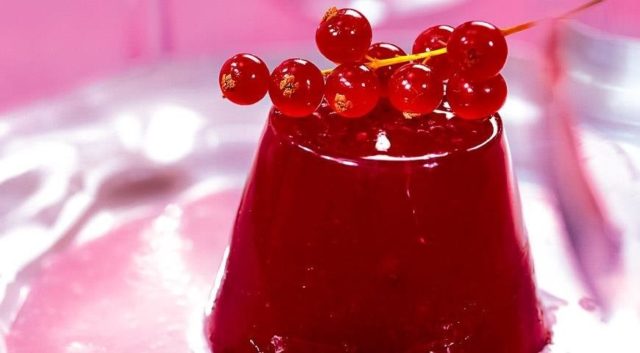
Desserts and sugar should be excluded, but a small amount of honey, pudding, jelly, non-butter cookies during the diet is acceptable for reflux esophagitis. Fruits such as banana, plum, pear can help prevent heartburn.
Prohibited foods
In case of gastrointestinal reflux, the following foods are prohibited during the therapeutic diet:
- bread, fresh pastries, baked goods;
- alcoholic beverages are prohibited even during remission;
- peas and legumes;
- rich broths;
- fatty fish, meat;
- pickles, marinades, conservation;
- strong tea, coffee;
- smoked meats;
- seasonings, mayonnaise, sauces, mustard;
- carbonated drinks, kvass, fruit and berry juices;
- almost all kinds of sweets, chocolate, halva;
- nuts and seeds;
- raw vegetables, mushrooms, radishes, onions, garlic, ginger;
- fast food.
Approximate meal plan for a week
Reflux esophagitis treatment is based on the use of drugs, diet, physiotherapy procedures. Sometimes, in advanced cases, they resort to surgical intervention. Of the listed therapeutic effects, diet is one of the main therapeutic measures for reflux esophagitis.
Monday:
- breakfast - semi-liquid rice mashed porridge, unsweetened tea;
- second breakfast - boiled egg;
- lunch - mashed vegetable soup, steamed meat cutlet, compote;
- afternoon tea - pureed cottage cheese;
- dinner - zucchini and potato stew, jelly.
Tuesday:
- breakfast - semolina milk porridge with dried fruits, tea with cookies;
- second breakfast - a sandwich with hard cheese;
- lunch - milk soup, low-fat steamed fish, fresh berry compote;
- afternoon tea - low fat milk;
- dinner - stewed meatballs, boiled cauliflower.
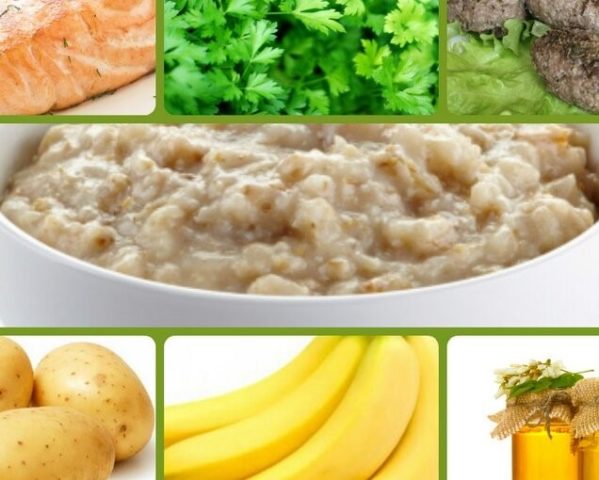
Wednesday:
- breakfast - steamed cheesecakes;
- second breakfast - milk jelly;
- lunch - soup, mashed from zucchini, steamed meat cutlet, green tea;
- afternoon snack - fruits from baby food;
- dinner - boiled potatoes with baked chicken breast, low-fat milk.
Thursday:
- breakfast - omelette in a double boiler, cocoa drink;
- second breakfast - boiled eggs;
- lunch - mashed fish soup, zucchini casserole, tea;
- afternoon tea - fruit soufflé;
- dinner - horns, baked chicken meat.
Friday:
- breakfast - liquid semolina porridge, green tea, bread with cheese and butter;
- second breakfast - vegetable puree, mineral water;
- lunch - noodle soup, chicken pudding, fruit drink;
- afternoon tea - low-fat kefir;
- dinner - cottage cheese casserole, dried fruit broth.
Saturday:
- breakfast - a sandwich with cheese, unsweetened tea;
- second breakfast - berry jelly, cookies;
- lunch - soup with meatballs, zucchini puree, kefir;
- afternoon tea - cottage cheese, baked apple;
- dinner - fish, squash puree, unsweetened tea.
Sunday:
- breakfast - rice porridge, weak coffee;
- second breakfast - cottage cheese, mashed with sour cream;
- lunch - chicken puree soup, steamed cutlet, buckwheat;
- afternoon tea - jelly;
- dinner - oatmeal in milk, boiled rabbit.
It is important that nutrition during the reflux esophagitis diet is complete and varied.
Conclusion
Diet for reflux esophagitis during an exacerbation is an important therapeutic measure. It allows you to reduce the negative impact on inflamed organs and prevent various complications. The disease cannot be started, otherwise the inflammatory process can be brought to the operation. Compliance with a diet for reflux esophagitis, a certain diet helps to stabilize the patient's condition and protects against repeated exacerbations of the disease for a long time.

